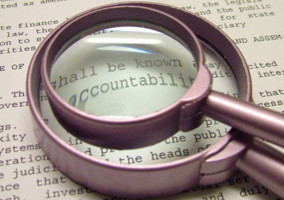From the 1st – 4th October 2019, Accountable Now celebrated Global Accountability Week along with a host of other civil society organisations (CSOs) committed to changing accountability practices across the sector. As part of our social media campaign, we demonstrated the progress being made in implementing our 12 accountability commitments by showcasing the projects we are partner to as well as our members’ and wider networks’ good practices.
Now we turn our eye towards Charity Finance Week, which gives us and organisations alike a chance to look deeper into the work being done to fulfil our tenth accountability commitment: well-handled resources, whereby we and our members are committed to handling our resources responsibly to reach our goals through the activities, projects and partnerships that we undertake.
Through our reporting process, we have been able to collect a variety of good practices from our member accountability reports. When it comes to our tenth accountability commitment, we can look upon a few exemplary practices by our members to understand how CSOs are implementing innovative approaches to financial transparency and accountability. For example, MIO-ECSDE carefully considers its criteria regarding the sources and conditions of funding from private actors – these must be transparent, carefully scrutinised, and free from any influence on MIO-ECSDE's policy and strategy. One of its main priorities is to maintain its independence while acquiring funding, and to ensure the diversification of its core funding and fundraising efforts. More information on this practice can be found here.
Another member’s demonstrating a commitment to financial transparency is Educo. Its implemented policies include a donation policy; a policy for collaborating with companies; and an investment policy. It confirms that funds received do not restrict the free action of the organisation while working with the Spanish Fundraising Association’s code of conduct for development fundraising. Its accreditation with Fundacion Lealtad is telling of its compliance with transparency, plurality in funding, and oversight in using its funds. Its accountability report and good practice demonstrate commitment to rigorous standards of accountability to transparent finances.
But financial accountability is only one dimension of our multifaceted approach to accountability and its practical application on organisational and sectoral levels. At Accountable Now, we promote and base our work upon dynamic accountability: a systematic approach to CSO accountability that goes beyond transparency and static, traditional forms of accountability. It is at the heart of the Global Standard for CSO Accountability – an initiative of nine well-established global civil society accountability networks. The Global Standard has the overarching aim of strengthening the effectiveness of CSOs worldwide. As the global secretariat, Accountable Now is committed to the Global Standard and its approach of dynamic accountability.
It is guided by the 12 accountability commitments, which can complement and supplement existing policies as they are voluntary and draw on a range of existing codes, norms, standards, and guidelines. They can be collectively divided into ‘what we want to achieve’, ‘our approach to change’ and ‘what we do internally’. It reminds us that we should hold ourselves accountable to various stakeholders and values, such as ‘justice and equality’, ‘women’s rights & gender equality’, and a ‘healthy planet’. Through ‘people-driven work’ and ‘strong partnerships’, we can ‘advocate for fundamental change’ and remain a transparent organisation.
This all-encompassing, holistic understanding of accountability is about redressing unequal power dynamics and building mutual partnerships with all stakeholders. Dynamic accountability is grounded in processes of meaningful engagement with all stakeholders that are inclusive, participatory and continuously practiced. Through our everyday work and commitment to this approach, we seek to create a transformational relationship between CSOs and their stakeholders to ensure an organisation’s way of working is adaptive to these stakeholders’ needs. This is necessary to truly achieve systemic change in the form of a power shift within and outside the organisation, towards the people a CSO works for and with.
Find out more on dynamic accountability and how it is already being implemented across civil society organisations from around the world in our applied research paper.
Bethany Keeley is communications officer and Violette Khammad is an intern at Accountable Now
Related articles
How to bring colour to your annual reporting
Trustees’ annual reports could build public trust, but are often dull and leave out important information. We need to bridge the expectation gap, says Kate Sayer.
Highlights from Charity Finance Week 2019
Keep up with the latest news and developments at our dedicated week of events, content and thought leadership initiatives.
|











